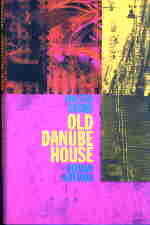Walter Grond: languages: german french
"Old Danube House"
Novel about a modern identity crisis
Translation: Janice Schützenhöfer
Nichol, who at first sees
Hofer as an "enfant terrible", studies him from his precarious position in an
attempt to understand this generation. He follows him to happening techno parties in
delapidated factory buildings, gets to know the pungent underground and finally allows
himself to be led by a woman who has fallen in with the esoteric to her "roots"
in Egypt. His journey takes him to the bosnian home of the eccentric Sahni where he
searches for his relatives and roots.

Buchumschlag
From
now on the book mutates into an engaging reportage from a devastated country that still
has a transendental undertone. Even when he meets up with a distant relative of Sahni, he
feels himself to be unexplainabley distanced from actual events. Like Leopold Bloom, he
stumbles through a world full of associations but without explainations. The burning
question from a Hemingway novel- how should a man live his life- imposes itself stronger
than ever due to the traumatic Bosnian relationships and the apathetic population.
ISBN 3-85218-335-9 Haymon-Verlag, Innsbruck, 280 pages.